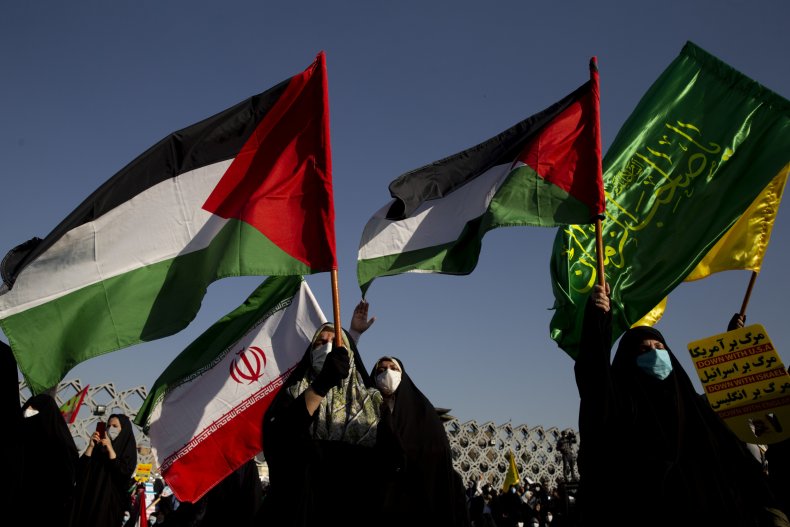The Biden Administration Must Hold Iran Accountable for Support of Hamas | Opinion
Now that a ceasefire has been achieved between Hamas and Israel, it is important to draw some lessons from the conflict and decide how the next one can be prevented.
Hamas and Palestinian Islamic Jihad (PIJ), the two radical organizations that have been firing missiles intermittently at Israel for more than 19 years, are designated as Foreign Terrorist Organizations by the U.S. Department of State. They are funded, armed and trained by the Islamic Republic of Iran. Hamas has served as Iran's most important Palestinian partner for over two decades.
Iran is estimated to send at least $100 million annually to Palestinian terror organizations, and as much as $700 million annually to Hezbollah terrorists along Israel's northern border. It is also a critical supplier of weapons to these terrorist organizations. Through naval interdictions and direct admissions from the Palestinian terrorists themselves, the scope of Iran's effort to arm Hamas and PIJ have come into the public view, as have the ways the Iranian regime smuggles weapons to Gaza: overland through Sudan and the Egyptian Sinai, and by sea via Yemen or Sudan and the Suez Canal. Israeli intelligence believes there are approximately 30,000 rockets and 10,000 mortar rounds in Gaza.
Hamas and PIJ have received Iranian missiles capable of hitting Jerusalem, as wells as drones, anti-tank missiles, anti-ship missiles and radar systems for guided missiles. Israel took fire this month from Iranian-made rockets, rockets produced in Gaza based on Iranian designs and advanced weaponry bought by Iran from Russia—including laser-guided anti-tank missiles and Grad rockets.
Hamas and PIJ do not hide the support they receive from Iran. Last year, Hamas permitted Al Jazeera to film it receiving Iranian missiles and Russian anti-tank shells, and told reporters that "Iran continues to support us without restrictions or conditions."
The extremist regime in Tehran must be held accountable for sending weapons to terrorists in Gaza, using its Islamic Revolutionary Guard Corps (IRGC) for training, and funding the purchase of other weapons being used against Israel and our Arab allies in the Middle East. If the U.S. and its allies in Europe do not deal with Iran's role as an enabler, the current ceasefire will only be a facade. It will soon be broken.
Diplomats negotiating a new Iran nuclear agreement in Vienna have it within their power to curtail Iranian meddling in the Israeli-Palestinian conflict, and help save countless lives in the process.
Iran's top priority in these negotiations is to free itself from the economic sanctions that the U.S. and other nations have enacted to cripple its economy. The U.S. and our European allies in Vienna must make clear to the Iranians that there will be no reduction in economic pressure unless they stop supporting, arming and training terrorist proxies in Gaza, Lebanon, Syria, Iraq and Yemen.

The U.S. and its allies should work to restore the international arms embargo against Iran, which expired in October 2020 through sunset provisions in Security Council Resolution 2231. The absence of these restrictions means Hamas and PIJ are more likely to receive more long-range advanced rockets, mortars and other weapons.
The Trump administration fought unsuccessfully to reimpose the arms embargo on Iran through a sanctions snapback mechanism, an effort which the Biden administration has abandoned. Russian and Chinese interest in selling weapons to the Iranian regime will make a new arms embargo an uphill battle at the United Nations. The first step for the U.S. and its allies in dealing with Iran should be to adopt and implement an independent plan for stopping the Iranian regime from providing advanced weaponry to its terrorist allies.
Second, the Biden administration should demand at the negotiating table in Vienna that policies designed to impede foreign capital from reaching the Iranian regime be strictly followed. That means confronting China over its purchase of sanctioned Iranian oil and taking steps to punish shipping companies that help Iran evade sanctions. It also means asking the Society for Worldwide Interbank Financial Telecommunication to terminate its relationships with all Iranian banks and financial institutions until Tehran verifiably ends its money laundering and terror financing.
Third, the Biden administration should maintain all existing sanctions against the Central Bank of Iran, which funds terrorism, and the IRGC, which supports and trains militants attacking Israel, Saudi Arabia, Yemen, Iraq and other American allies.
President Biden was principled and effective during the recent conflict. He supported Israel's right to defend itself, stating clearly that only when the other nations in the region accept Israel's right to exist as an independent Jewish state will there be peace in the Middle East.
Making a deal with the Iranians in Vienna which does nothing to stop Tehran's support of terrorist groups undercuts both of those principled policies.
President Biden can make clear in Vienna that the United States will not tolerate support for terrorist organizations and will economically isolate Iran if the practice continues. Maintaining and strengthening economic pressure on Tehran could even lead to constructive negotiations between Israelis and Palestinians for a two-state resolution of their conflict. That would truly benefit the Israeli and Palestinian people who are now victimized by Iran, Hamas and PIJ.
Joseph I. Lieberman, a former U.S. senator from Connecticut and vice presidential nominee, is chairman of United Against Nuclear Iran (UANI). Mark D. Wallace, a former U.S. ambassador to the United Nations for Management and Reform, is CEO of UANI.
The views expressed in this article are the writers' own.


